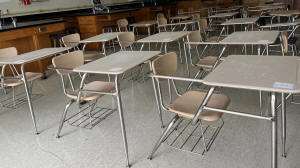Lawmakers, advocates call for change after reading and math scores
disappoint
[September 13, 2025]
By Catrina Barker | The Center Square contributor
(The Center Square) – An Illinois lawmaker warns that, according to the
latest Nation’s Report Card, Illinois students are still behind in
reading and math post-pandemic, while homeschool advocates call for more
parent-driven education options.
State Rep. Reagan Deering, R-Decatur, a Mt. Zion Community School Board
member and parent, said politicians prioritized teachers unions over
students, leaving children behind academically.
“Schools stayed closed too long. Dollars went to bureaucracy before
classrooms, and there was no urgency in providing tutoring, extending
learning time, or improving attendance,” Deering said. “Teachers did
their best under difficult circumstances, but inconsistent guidance and
misplaced priorities from politicians have left families paying the
price.”
Sarah Fletcher, former charter school educator and Head of School at
White Horse Academy, explained the data confirms what she has seen for
years.
“Even before COVID, Illinois proficiency rates weren’t strong,” Fletcher
said. “The pandemic didn’t cause these problems, but it revealed them.
Parents finally saw firsthand on Zoom what their kids were learning, or
not learning.”

Deering argued that families should be treated as true partners in
education rather than an “afterthought.”
The 2024 National Assessment of Educational Progress shows Illinois
eighth graders scored the average scale score of 277 in math, above the
national average of 272, but just 32% reached proficiency, highlighting
ongoing struggles.
According to the new NAEP data, 33% of Illinois eighth graders were in
proficient reading.
Deering criticized Gov. J.B. Pritzker, who has been in office since
2019, for failing to implement a clear plan to address gaps in reading
and math.
“There’s no plan, toolkit, or accountability structure to improve our
outcomes. Illinois schools deserve leaders who are going to prioritize
their students’ needs and empower them with the tools necessary to help
lower-performing students catch up,” said Deering. “Parents are right to
be frustrated. As with so many government programs, support sounds good
on paper, but families can’t use them if sessions aren’t available after
work, there’s no transportation or they’re not getting the information
about what’s available.”
[to top of second column]
|

Alan Wooten | The Center Square

Deering said the learning loss was inflicted on students by the
government failures.
“Now the government wants us to trust them to solve the problem it
created. I don't buy it, and throwing money at our kids won't make
up for the learning loss they've been experiencing. State
legislators who stood up to the government bureaucrats who shut down
our schools should have a seat at the table,” said Deering.
Shelby Doyle, senior vice president of policy and national
partnerships at the National School Choice Awareness Foundation, in
a statement said, “What’s especially concerning is that reading
scores are down in both 4th and 8th grades, with one-third of 8th
graders not even reading at a basic level. In math, 4th-grade scores
showed modest progress, but only for middle- and higher-performing
students. Meanwhile, 8th-grade math scores remain flat, leaving in
place the historic 8-point drop we saw in 2022.”
Doyle said these results highlight two troubling patterns:
lower-performing students continue to fall behind, and achievement
gaps are growing wider.
Fletcher, a kindergarten teacher, said smaller classrooms allow more
individual attention and parent involvement, noting over half her
students left reading by year’s end. She contrasted that with public
schools, which she argued rely too heavily on sight words and
guessing instead of systematic phonics.
“English isn’t random, it has structure and rules. But when kids
aren’t taught that, reading just becomes memorization, and they fall
behind. English has something like a half a million words. There’s
no way you could memorize them” she said. “Parent involvement is one
of the biggest predictors of success. When parents are engaged, kids
thrive.”
All contents © copyright 2025 Associated Press. All rights reserved
 |